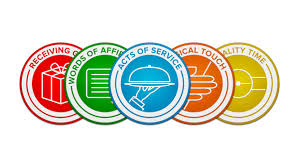When I googled “How Do You Say I Love You?”, over 500 million entries showed up. Several magazines were at the beginning of the list along with WikiHow and CNN. You might be thinking “why would he google that?” I’ll tell you why. I wanted to know how popular that search was. Many of the suggestions were for other languages while others had to do with relationship advice. People want to know how to say those very important words, even if they don’t actually want to use those three words specifically. Gary Chapman wrote the book The 5 Love  Languages in 1992. That book has sold over 9 million copies and has been revised several times. It is a very helpful book for married couples to learn to speak the love language of each other.
Languages in 1992. That book has sold over 9 million copies and has been revised several times. It is a very helpful book for married couples to learn to speak the love language of each other.
I have talked to other Christian Counselors about this book. Some do not find any validity in the book because the Bible does not specifically talk about love languages. The Bible tells us that we are to love our wives (as husbands) and then it shares with us the reasons for marriage. But it does not specifically mention the love languages. Other counselors make this book a requisite for their counselees. I have read the book, took the inventory, taught the small group study, as well as recommended the book to most of the couples that have come into my office. I use the inventory primarily as I am wanting to help couples understand each other amid their differences. If you would like to take the inventory, you can go to The 5 Love Languages web site. http://www.5lovelanguages.com/ It is on the very front page. (I would encourage you to do so. You might be surprised at what you learn.)
It is very important in a relationship that both spouses understand that they are loved and appreciated. Therefore, this inventory along with the book will help accomplish that. The 5 Love Languages are Words of Affirmation, Quality Time, Receiving Gifts, Acts of Service, and Physical Touch.
Words of Affirmation: A person with this love language appreciates hearing “I love you,” “Thank You,” “You’re Special,” and other phrases such as these. This person is a verbal lover. This person does not respond well to any criticism or negative talking. If the positive is encouraging, then the negative is equally (or more so) discouraging.
Quality Time: This love language is all about spending time together with no interruptions. Maybe going for a drive together or a casual walk will mean a great deal to this person. He/she doesn’t want the TV on all the time and gets offended when the other person is on the phone or the computer when they are trying to talk. It is difficult to get good quality time when you have small children, but it will be worth it.
Receiving Gifts: A person that has this love language really emphasizes gift giving in the relationship. He/she wants to keep everything that has ever been given and they can’t wait to get gifts on birthdays or holidays. The special little nicknack that is given for no particular reason speaks volumes to the receiver. The cost of the gift is not what’s important; it’s who is giving the gift and the thought behind it.
Acts of Service: This love language focuses on doing projects together and helping one another. Also, this person appreciates tasks done that they don’t have time to do or they don’t like to do. When a spouse has this love language, he/she has a great desire to help the other with the chores. If a chore is promised but not completed, the hurt can be magnified and the trust can be lost. Actions are extremely important to the person who has Acts of Service as a love language.
Physical Touch: This language has to do with being close to one another and touching throughout the day and night. Holding hands, hugs, back rubs, and more are very important to this person. Yes, the non-sexual touch can lead to sexual touch, but it does not have to. Many wives have shared with me that they are afraid to show the non-sexual touch because when they do, their husbands expect the sexual touch to follow quickly. It is critical to meet the needs of non-sexual touch without any expectations.
Obviously this is a brief summary of each of the languages. Once you take the inventory, your summary will be e-mailed to you with greater detail than these. I believe that it is important to learn your spouse’s love language so that they might feel loved and appreciated. It is fairly easy to use your own love language, but can be very difficult to use your spouse’s. Have fun learning and attempting to say “I Love You” using these categories.
Have you found 5 Love Languages helpful in your relationship? I would love to hear how in the comment section below.
![]()
After spending more than 25 years on church staffs, God has allowed me to take the experiences and knowledge that I gained to develop a Biblical Counseling ministry. The basis of this ministry is to allow God’s Word to shine on the main issues in peoples’ lives in order to bring His resolutions to problems.
